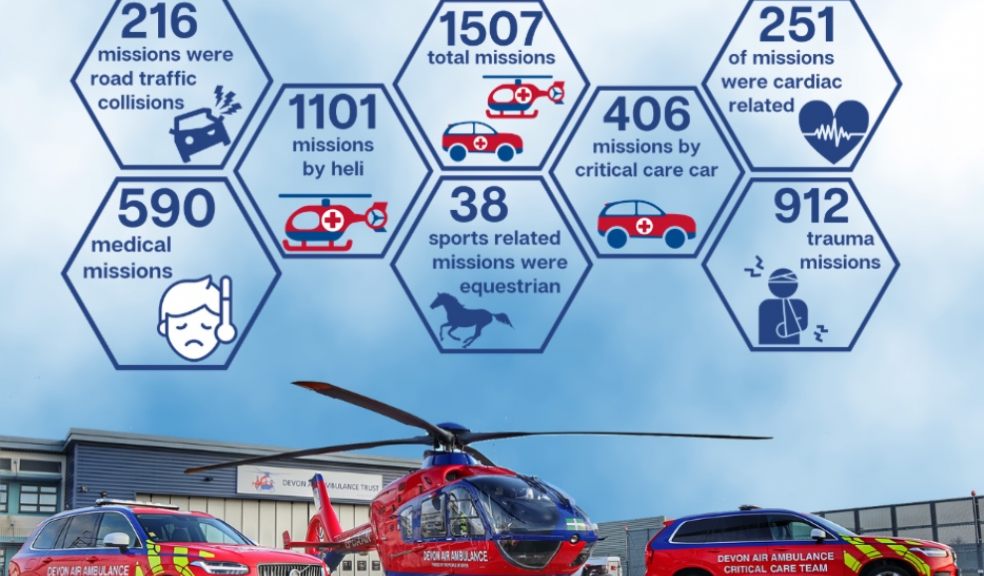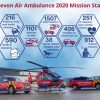
Devon Air Ambulance responds to over 1,500 missions
Devon Air Ambulance (DAA) has revealed its mission statistics for 2020,which shows just how vital the response of the medical emergency service isto the people of Devon, even during a pandemic and continuing lockdown periods.
Throughout the year the charity has been tasked to attend over 1500 incidents across Devon and were, on many occasions, also called to assist across our borders in neighbouring counties. Of those missions, 590 were to help patients with medical emergencies (those suffering with a medical condition) and 912 trauma-related incidents (accidents and injuries caused by slips, trips, falls, burns and collisions to name just a few). Crews assisted 607 male and 261 female patients, plus 68 children who also needed their expert care.
July was DAA’s busiest month of the year and Sunday their busiest day of the week. This is thought to be due to many people taking time out for their favourite hobbies and pastimes at the weekend, as well as those carrying out home improvement plans that don’t always go as smoothly as intended. Twoof the most common sporting groups they were tasked to were equestrian related (38) and cyclists (29).
Nigel Hare, Patient Services Operations Director commented about the year:
“Following the initial reduction in call outs to patients during the first lock down, 2020 has been both busy and challenging for our service. The school Summer holiday period is always busy for Devon Air Ambulance, but in 2020 the demand for our service remained very high from April right through to October.
Although November brought a brief return to normal levels, the number of patients we have deployed to in December, and so far during January, has been similar to the number of patients we normally respond to in the summer.”
Being tasked to 406 incidents, it’s very clear that the two, rapid response,Critical Care cars introduced by DAA in February 2020, have made a significant contribution to the service. Kitted out with blue lights and the same medical equipment found on board the helicopters, these vehicles can provide a swift response to patients and can sometimes access heavily built-up areas more easily than the air ambulance, which needs an open space to land safely.They also enabled the service to keep responding to medical emergencies when the helicopters were temporarily stood down in March to be made Covid-Safe.
Night landing sites have also proved invaluable in the past year as 207 missions took place during the hours of darkness. The charity now has over 160 landing sites situated throughout the county which provide a safe place to land away from unseen obstacles, enabling the pilot to bring a life-saving service into the heart of those communities up until 2am. A community landing site, is developed and part-funded by the local community, and couldbe located on a green, field, sports pitch or playing field. DAA is always keen to hear from any local communities who are interested in finding out more about them and you can contact Toby Russell, DAA’s Community Landing Site Officer at t.russell@daat.org.
It is important to remember that this service is not Government funded and although DAA works together with land ambulance crews at the scene, thecharity is not part of the NHS. DAA is funded by the generosity of the people of Devon and tasked to an incident to deliver an enhanced level of 'critical’care to the patient when minutes matter. This would not usually be available to the patient until they reach a hospital Emergency Department.
Times have certainly changed from the old way of thinking that the air ambulance simply collects a patient and delivers them quickly to hospital. Today, this service is about highly skilled critical care paramedics and doctors delivering advanced lifesaving treatment and interventions on-scene, stabilising a patient and then transporting them to the hospital which offers the specialist treatment needed to provide the patient with the best possibleoutcome.
The DAA medical team conveyed 184 patients by air in 2020, but also accompanied 271 patients on their journey to hospital in a land ambulance so they could continue to observe, monitor and treat them with the enhanced care they needed until their arrival at hospital.
If you would like to support your local air ambulance, visit www.daat.org.You will also find a list of further interesting mission statistics for 2020 at www.daat.org/mission-facts














